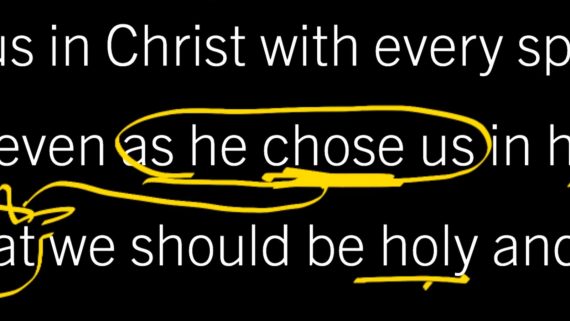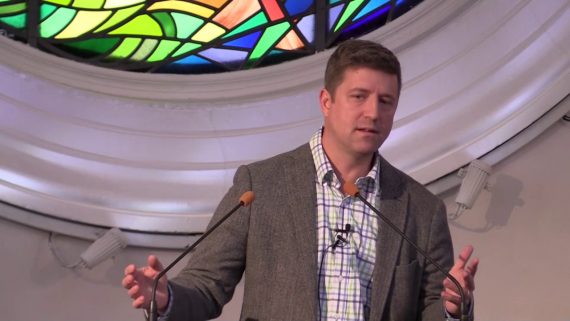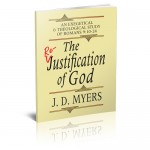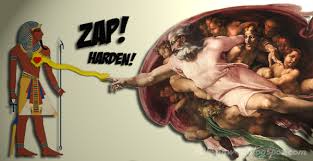What is election? Who are the elect? Why are they elect? How can you know if you are one of the elect? These are some of the questions we answer in this podcast study of Ephesians 1:4. We will also look at the Democrat effort to pack the Supreme Court and answer a letter from a listener about televangelists who don’t believe in eternal security.

Democrats Want to Pack the Supreme Court
The podcast begins with a brief discussion about the Democrat efforts to pack the Supreme Court. Listen to the podcast to hear my thoughts on the subject.
Letter from a Listener
Hello again Jeremy… I’m about to begin to read one of your books plus I’m still thinking about joining your discipleship group … I have some questions that I want to run by you… There are a lot of tv evangelists and prophecy teachers that do not believe in the security of the believer… They have all kinds of education yet they distort the message of life… Why is that Jeremy??
Brad
Brad also had a question about an author named Dr. Thomas Horn. I have never heard of him or any of his book, so I can’t say anything about him.
Listen to the podcast to hear my answer to Brad’s question.
Why are some people elect (Ephesians 1:4).
Ephesians 1:4 provides us with the the who, what, and why of election. This podcast is a summary of what I wrote elsewhere on my website about Ephesians 1:3-4, and I have also written a book on election titled (#AmazonAdLink) The Re-Justification of God, and have a entire lesson in my Online Discipleship group about election. Also, here is an article I wrote titled “Election is to Service.” But let us see what we can learn from Ephesians 1:4.
Ephesians 1:4. just as He chose us in Him before the foundation of the world, that we should be holy and without blame before Him in love.

The term election in not even in this verse. In fact, the word election is not found in the entire letter of Ephesians. But since “to elect” simply means “to choose,” I believe we can take this passage as a key text on election and predestination, because the term “he chose us” is found in this verse.
Since being chosen is in view, there are three questions we can ask which will help us understand the text – and all texts similar to it. First, who is chosen, and second when are they chosen, and third, why are they chosen? Let’s answer them one by one.
1. Who is chosen? (And what is election?)
The text says he chose us in Him. The phrase “in Him” tells us that this blessing of being chosen is something that we have in Christ. Jesus Christ is the first chosen person. Christ is the choice servant of God (cf. Luke 9:35; 23:35; 1 Peter 2:4, 6).
The traditional view of election is that election was a choice God made in eternity past about which unregenerate sinners He would regenerate to spend eternity with Himself.
But right away, we see problems with this from Ephesians 1:4, because Paul writes that God chose Jesus. Yet was Jesus an unregenerate sinner? No, of course not. But if election is God’s choice of which sinners He spend eternity with Him, then how can Jesus be an elect person?
In response to this, people say “Well, Jesus was a special case. Jesus is elect, but He was not a sinner. He was chosen by God to perform a special task or purpose.”
Okay. So in the case of Jesus, the definition of election changes? Maybe it would be better to use the same definition of election across the board for everybody, so that if, for Jesus, election means “choose Him to perform a certain task or function,” then election for other people could also mean “choosing people to perform a certain task or function.”
 Do you see the logic here? If we are going to say Jesus was elect, and that this means that He was chosen by God to perform a certain task, then the same meaning of election should apply to others also. And indeed, this is exactly what Scripture reveals when we study all the other passages on election in Scripture.
Do you see the logic here? If we are going to say Jesus was elect, and that this means that He was chosen by God to perform a certain task, then the same meaning of election should apply to others also. And indeed, this is exactly what Scripture reveals when we study all the other passages on election in Scripture.
Election has nothing whatsoever to do with God choosing which people get to be regenerated and receive eternal life so that they can spend eternity with Him. Instead, election occurs when God chooses certain people to perform certain tasks in world history.
Election is not God’s choice of who gets eternal life; election is God’s choice of who will serve His purposes and how they will do it.
Election is not to eternal life; election is to service.
Note that if it was true that election refers to God’s choice to give eternal life to just certain people out of all the mass of unregenerate sinners, then Ephesians 1:4 would read “He chose us to be in Him.” But that is not what the verse says. It says, “He chose us in Him” not “He chose us to be in Him.”
This is one of the points I argue in my book (#AmazonAdLink) The Re-Justification of God, and there is another great book on the topic from Shawn Lazar titled (#AmazonAdLink) Chosen to Serve. I also have a previous podcast episode on this topic also. The episode is titled “Election is to Service.”
With this definition in mind, it helps us understand what Paul means in Ephesians 1:4 when it says that God chose us in Jesus Christ. Who is the “us” that Paul is referring to?
From Ephesians 1:1-2, it refers to Paul and the believers to whom he was writing. In verse 3 the word “us” refers to those who are blessed in the heavenly realms. In verses 6, 7 and 8, “us” refers to those who have received the riches of God’s grace. So whom does the “us” refer to? In the context here, it refers to those who are already Christians.
So here we see exactly the same thing we saw with Christ. Christ is the eternally begotten Son of God, and God chose Him for a special task. But in choosing Christ, God also chose those who are in Christ—in other words, Christians. This verse does not teach that God chose unregenerate people to become Christians. This verse teaches that God chose Christians. And just as God chose Jesus to perform a certain task, God also chose Christians to perform a certain task.
Jesus ultimately is the chosen one, and by nature of being in Christ, we were chosen because He is chosen.
God’s choice has nothing do with who will go to heaven and who will be sent to hell, of who has eternal life and who does not. His choice in Ephesians 1:4 and He chooses them to perform tasks while we are here on earth. God chooses Christian men and women to perform a task. A study of God’s choosing and election throughout Scripture will reveal the same truth. God does choose. He does elect. But never to eternal life or eternal death; He chooses groups or individuals for certain tasks.
Now, it needs to be said that even though the in the context here, only Christians are in view, this does not mean that God cannot choose unbelievers to fulfil certain tasks. In fact, other passages show that God can and does sometimes choose unbelievers to perform certain tasks. This means that even unbelievers can be elect. Indeed, Scripture reveals that people like Pharaoh, King Cyrus, and Judas, were all chosen, or elect, even if they never received eternal life. They were chosen by God to fulfil a certain task or function in God’s plan for human history.
So once again, we see that the definition of election holds true when we think of it as being chosen to serve.
Paul goes on in verse 4 to state when Jesus Christ was chosen. This is the next question we want to ask the text to help us understand what election is.
2. When Did the Choice Occur?
The next phrase in Ephesians 1:4 is before the foundation of the world. Since the primary chosen one is Christ, the primary focus of this phrase is also Christ. It is Christ who was chosen before the foundation of the world.
This means that before the world was ever created, Jesus Christ was chosen, and by inference, all who would eventually be placed “in Christ” by faith in Him were therefore also chosen. So this choice took place in eternity past, before the foundation of the world.
This then leads to the third question about election, which is the most important of all.

3. Why Were They Chosen?
This is the missing piece of the puzzle that fits everything together. If you’ve ever been confused about election – here is the key. The question we are asking now is: “Why did God choose all those who have placed faith in Christ?”
He chose them, according to the end of Ephesians 1:4, so that we should be holy and without blame before Him in love. This is a task believers are to strive for and a future that God guarantees.
Notice that there is nothing in this verse about God choosing some to receive eternal life, while leaving all others to be damned—as some teach. Neither is there anything about God looking ahead in time to see who would believe in Him for eternal life and then choosing them—as others teach.
Instead, Paul writes that those who are chosen are those who are in Christ. In other words, believers are not chosen to receive eternal life—they are chosen to fulfill a task or purpose. As Paul describes it here, they are chosen to be holy and blameless!
Here again we see the truth of election.
Election is never to eternal life. God chooses certain individuals for a task, not for eternal life.
The people of Israel are the perfect example. God chose Abraham, and in choosing Abraham, God also chose all the people who could come from Abraham, namely, all the people of Israel.
So let me ask you, were all Israelites the chosen people of God? Yes, they were. But did all Israelites have eternal life? No, they did not. So you see that even with the people of Israel, election does not mean that God decides to give eternal life to some people. All Israel was elect, but not all Israelites had eternal life. What this means is that election has nothing to do with who has eternal life and who does not, and everything to do with God’s choice of certain people and nations to perform certain tasks and purposes in He plan for the world.
Judas is another example. Did you know that Judas was chosen (John 6:70)? But most believe that Judas did not have eternal life. Therefore, how can we say that Judas is chosen? We must say that he was chosen, not to eternal life, but to fulfil a certain purpose or task. And that makes perfect sense with what we see Judas do in the Gospels.
Both Abraham’s election and Christ’s election and all those who were in Abraham and all those who are in Christ are chosen, not to salvation, but to a task.
So when it comes to election, you should not be asking yourself whether or not you are elect. Instead, if you are a believer, you should be asking yourself why you are elect. Because you ARE elect. God has chosen you to complete a certain task and job in this world. You are part of God’s team on planet earth, and He has a role for you to play on the team.
Do you remember in grade school at recess or gym class standing in a line while two team captains picked who they wanted to be on their team? You never wanted to be chosen last. You wanted to be chosen first, right? Well, here in Ephesians 1:4, we see that God has chosen you first. You are on His team.
And in those grade school settings, why were certain kids chosen first? Because they were among the best. They were chosen because they were fastest, tallest, strongest, the most athletic, or whatever. The same is true with God choosing you. You are chosen because God thinks you are the best at doing something. God has something for you to do with His team that only you can do. That’s why He chose you. Because He wants His team to win, and He needs you to help out.
So if you have been chosen by God to be on His team, this means that you need to find out why God has chosen you to be on His team. You need to find out what role He wants you to play. What task He wants you to complete. What function He wants you to fulfil.
And how can you do that?
 Well, that is what the rest of Ephesians is all about.
Well, that is what the rest of Ephesians is all about.
The first three chapters of Ephesians are all about the blessings and privileges we have as members of Team God and then the last three chapters of Ephesians are all about what God wants you to do with those blessings and privileges. How you are supposed to contribute to the team effort of winning the battle on this earth. We will continue to learn more about this next time when we look at Ephesians 1:5.







 He can elect believers or unbelievers.
He can elect believers or unbelievers. So Jesus is not referring to the calling or election of some to eternal life, but is teaching the consistent biblical message that while God desires that all people will serve Him, not all do, and so God chooses to work with those who participate with Him in what He is doing in the world.
So Jesus is not referring to the calling or election of some to eternal life, but is teaching the consistent biblical message that while God desires that all people will serve Him, not all do, and so God chooses to work with those who participate with Him in what He is doing in the world. Third, the gathering of the elect from the four winds does not refer to some sort of future rapture event, but to God gathering Jewish people from all over the world to return to Israel so that His plan and purposes for them can be fulfilled. In the context, Jesus mentions the people of Judea (Matthew 24:16), and references the image of the fig tree which is a symbol for Israel (Matthew 24:32-35).
Third, the gathering of the elect from the four winds does not refer to some sort of future rapture event, but to God gathering Jewish people from all over the world to return to Israel so that His plan and purposes for them can be fulfilled. In the context, Jesus mentions the people of Judea (Matthew 24:16), and references the image of the fig tree which is a symbol for Israel (Matthew 24:32-35). In John 15:16, Jesus provides an extremely clear statement about what it means to be chosen and why certain people are chosen by God, and by Himself.
In John 15:16, Jesus provides an extremely clear statement about what it means to be chosen and why certain people are chosen by God, and by Himself.

 Western theology has committed a terrible disservice to this imagery of a potter and clay by making it seem as if God is a deterministic puppet master up in heaven pulling the strings of people and nations down here on earth.
Western theology has committed a terrible disservice to this imagery of a potter and clay by making it seem as if God is a deterministic puppet master up in heaven pulling the strings of people and nations down here on earth.
 And what makes one vessel clean or unclean? As H. H. Rowley pointed out above, God allows humans to determine what kind of vessel they will be, and then He uses those who have made themselves vessels of dishonor.
And what makes one vessel clean or unclean? As H. H. Rowley pointed out above, God allows humans to determine what kind of vessel they will be, and then He uses those who have made themselves vessels of dishonor.
 In Romans 9, Paul writes about the hardening of Pharaoh’s heart for the purposes of making God’s glory known. This seems rather harsh to some.
In Romans 9, Paul writes about the hardening of Pharaoh’s heart for the purposes of making God’s glory known. This seems rather harsh to some. But in response to this, Calvinists argue back that although the text says that Pharaoh hardened his own heart before God hardened it, before Moses even went to speak to Pharaoh, God told Him that He planned to harden Pharaoh’s heart (Exod 4:21; 7:3).
But in response to this, Calvinists argue back that although the text says that Pharaoh hardened his own heart before God hardened it, before Moses even went to speak to Pharaoh, God told Him that He planned to harden Pharaoh’s heart (Exod 4:21; 7:3). The issue is not about who hardened Pharaoh’s heart first—though that is where most of the ink has been spilled—but rather about what it means for Pharaoh’s heart to be hardened.
The issue is not about who hardened Pharaoh’s heart first—though that is where most of the ink has been spilled—but rather about what it means for Pharaoh’s heart to be hardened. Pharaoh’s eternal destiny is not under discussion in Exodus or in Romans, and so Pharaoh’s heart can be hardened so that God’s purposes are achieved, while still leaving plenty of room for Pharaoh to believe in God’s promises and become one of God’s people.
Pharaoh’s eternal destiny is not under discussion in Exodus or in Romans, and so Pharaoh’s heart can be hardened so that God’s purposes are achieved, while still leaving plenty of room for Pharaoh to believe in God’s promises and become one of God’s people.